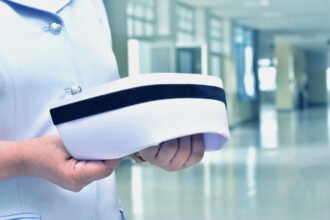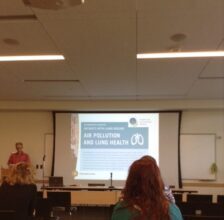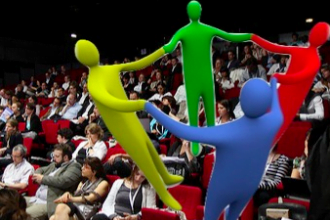I had a great opportunity to skype in to give a brief talk on Saturday at the American Society of Clinical Oncology (ASCO) meeting.
I had a great opportunity to skype in to give a brief talk on Saturday at the American Society of Clinical Oncology (ASCO) meeting. My topic was on how oncologists are using social media and new technology as an element of their lifelong learning, and I was able to present some recent research on what I have referred to as the ‘meaningful use of social media.’ Much of the data that I presented was a deeper dive into my presentation given last year at medicine2.0.
As our question and answer session unfolded the topic of using QR codes on posters was being bounced around and a few folks made suggestions about how posters could be shared more effectively by allowing attendees to scan these codes with the added benefit of minimizing crowds and allowing the data from more research to be aggregated more quickly. While the use of QR codes to support these efforts likely deserves a post of its own, I was able to explore a different angle on the discussion, and I would love to share this line of thinking.
I have written in-depth about how the data stream from major medical meetings needs to be re-engineered to drive dissemination of new findings and best practices much more effectively. This is a central passion of mine and I currently have the pleasure of working with a few medical associations and societies to explore these ideas – hopefully we will have some pilot models in the next year. But there is another side to this re-engineering that may be even more important to supporting lifelong learning and driving higher quality healthcare.
To introduce the idea, I need to present the problem: At this year’s ASCO meeting there are more than 35,000 healthcare professionals from around the world converging on Chicago to share and learn about the latest and greatest advance in oncology care — but each attendee is entirely on their own to craft a ‘data aggregation & retention’ plan from the various session they attend, sessions the missed, posters they passed by, and hallway conversations they had. It seems safe to say that there are close to 35,000 separate approaches being employed to archive lessons, commit them to memory, or build a repository (of post-it notes or journal entries) that attendees can call upon when needed. I like to say that there are 35,000 separate jerry-rigged content architectures being put into action by attendees at ASCO and (IMO) few, if any, of them would be found to be successful if put to the test.
So how do you tackle this problem yourself when attending a meeting. Where/how do you take your notes? When (if ever) do you revisit them? Are you prepared to employ new lessons in practice? Have your notes ever actively supported your learning? (this last one might take a second to sink in…)
By an educated guess, the annual ASCO meeting costs $8-10 million dollars to develop and implement. The costs of learners to attend and travel is somewhere in the ball park of $100,000,000 (I double checked my math). And yet there is no evidence-based, engineered platform to support the learning of those in attendance. Simply put, this is a really bad model. This is bad for the researchers trying to share their data, much of which will soon be forgotten. This is bad for attendees who are spending money and time to leave practice to absorb the newest lesson in care, but attendees find themselves already saturated and often miss out on the most important stuff. And, this is bad for patients from around the world who are dependent on having the late-breaking, potentially life-saving lessons brought back and integrated into practice…could this need be anymore urgent?
Having focused my career for the past 10 years on improving medical education, the reality is that it is not always easy to connect learning theory back to the big picture…but this is not one of those times. The lack of a re-engineered system that provides the end-user control of their learning wastes $100,000,000′s of dollars and millions of professional hours…and I for one do not think it is an overstatement to suggest that our ‘broken and fragmented’ system of professional lifelong learning very likely costs us of thousands of patient lives each year.
(And this is just ASCO, I could have written this post about Digestive Disease Week (DDW) last week or American College of Cardiology’s Annual Scientific Session in March – the reality is that each of the numbers above could be multiplied 10 times over and still be a conservative understatement.)
Perhaps this is the first time you have pondered the complexity of this system. And, perhaps this is the first time the flaws have been made so transparent. But spending more time and more money on more research, more Powerpoint slides, and more posters will continue to be a low gain investment. It is a critical time to begin to conceive a re-engineered solution that makes new content and best practice lessons truly available to learners AND gives the learners effective control of this information flow in ways that support their learning and practice.
All the best,
Brian








